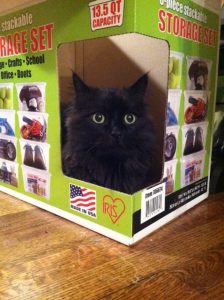Park Hill Vet: The Tiger At Home
Resolve To Have A Healthier Kitty In The New Year
By Margot K. Vahrenwald, DVM, CVJ
 2022 is the Year of the Tiger in the Chinese calendar. The Tiger is known as the king of beasts in China and is a symbol of strength, exorcising evils and bravery. I wish everyone those attributes as we go into the new year.
2022 is the Year of the Tiger in the Chinese calendar. The Tiger is known as the king of beasts in China and is a symbol of strength, exorcising evils and bravery. I wish everyone those attributes as we go into the new year.
However, I really want you to focus on the small tiger or tigers in your home. Be brave and strong and commit to ensuring that your cat or cats are getting a proper veterinary exam this year to ensure their good health. You can put that small demon in a carrier and get him or her to the veterinary office; call your veterinarian for suggestions on how best to do so and for medications to calm the beast.
Our cats are so self-contained and independent that it is easy to think that they need no assistance in maintaining their purr-fect health. But that’s a fallacy that endangers a significant percentage of the 95.6 million cats living in US households based on 2017 numbers (and likely higher with the increase of pandemic pet adoptions).
Why? Because several large veterinary studies over the last decade have shown that cats get gipped on preventative care and are seen later in the course of acute and chronic disease states. During the same decade, we have seen a significant increase in the diagnosis of feline diabetes, an increase in severity of dental disease and higher rates of cancer. We are seeing sicker feline patients at presentation, often giving us less options for supportive care and treatment.
Cats that receive regular preventative care, dental care and treatment along with regular lab diagnostics screening (especially after age 10 when senior changes can begin) live longer and maintain their quality of life. This means more time to enjoy the antics of the small tiger or tigers living with you.
All cats, including indoor kitties, need regular veterinary care. Being an indoor cat protects against many of the killer risks of being outdoors, but it does not mean that your cat cannot or will not get sick from a variety of causes. An indoor cat has the same risk for developing several infectious diseases or cancer as an outdoor cat and has a much higher risk for the development of diseases associated with obesity, such as diabetes.
Cats are masters of hiding symptoms and compensating until they just can’t – so often by the time we notice changes at home, they have been ill for a while. What regular examinations allow is the detection of changes much earlier and open up more treatment options, including many that are significantly less costly than when the pet is really ill and may need aggressive care or even emergency treatment.
Lastly, all cats need vaccinations. Municipal laws in every city and state require all cats to be vaccinated and regularly reboostered against rabies. Other vaccinations should be tailored to each cat’s risks and lifestyle to help maintain appropriate immune protection.
So get that tiger … um, ur, cat scheduled for their preventive care examination today.
Dr. Margot Vahrenwald is the owner of Park Hill Veterinary Medical Center at 2255 Oneida St. For more information, visit parkhillvet.com
